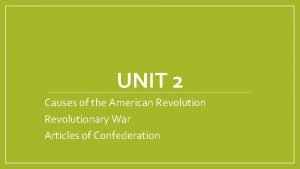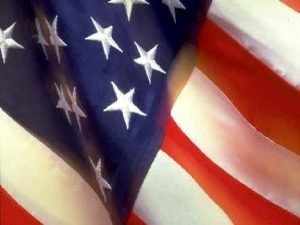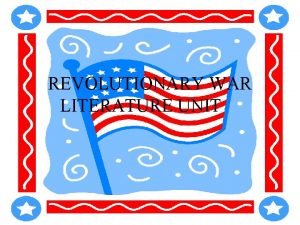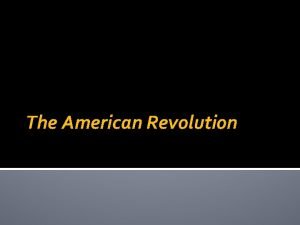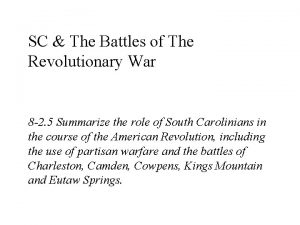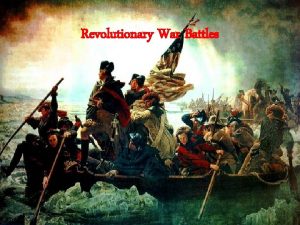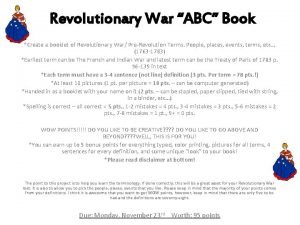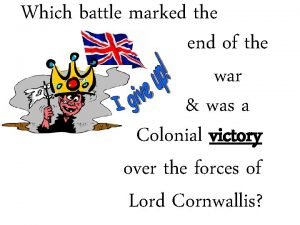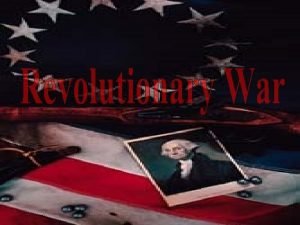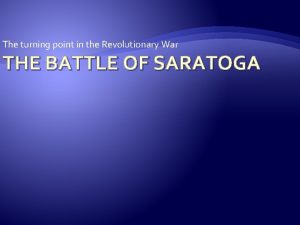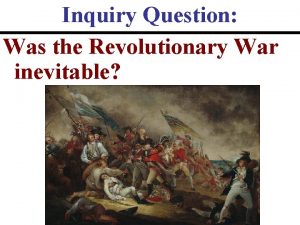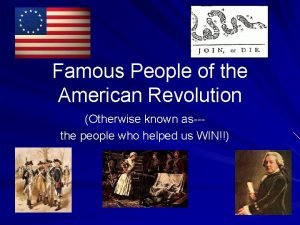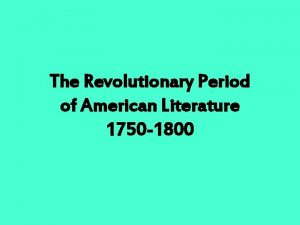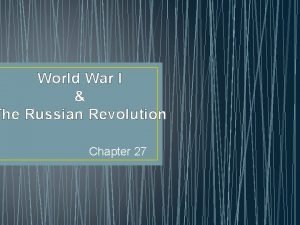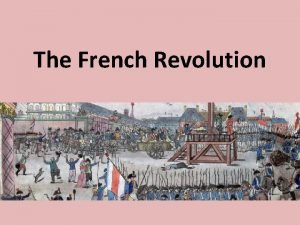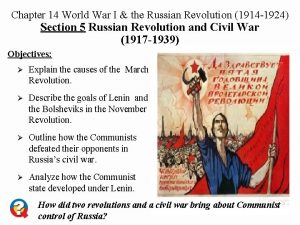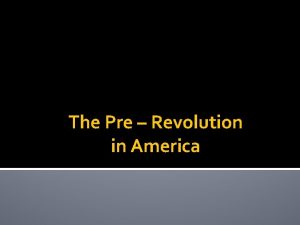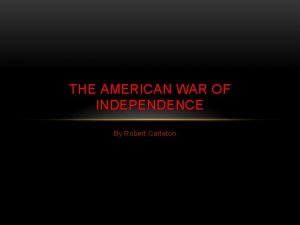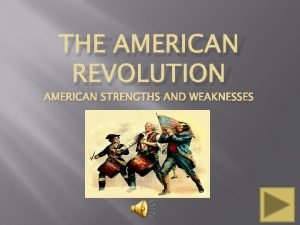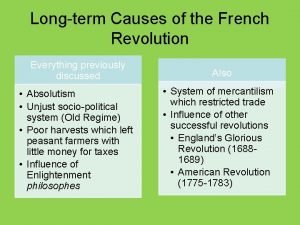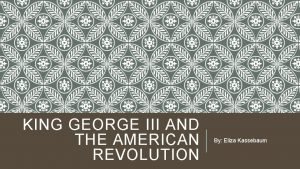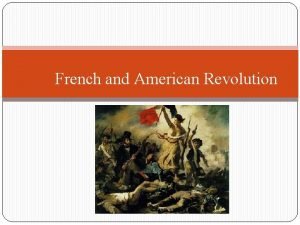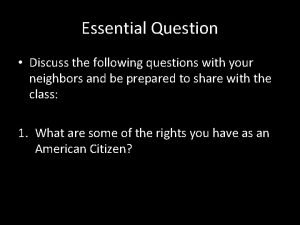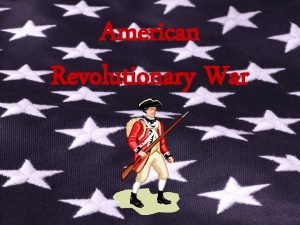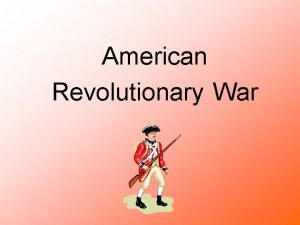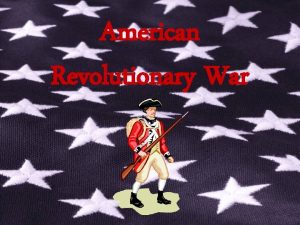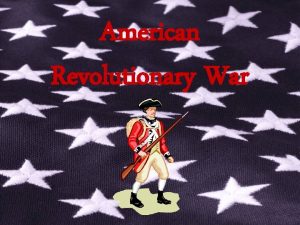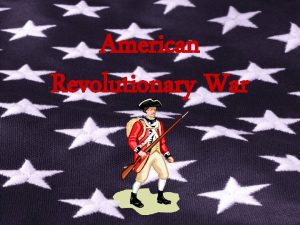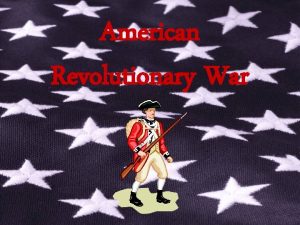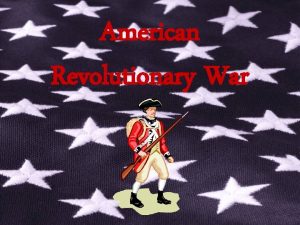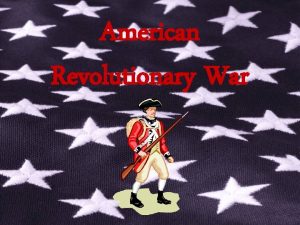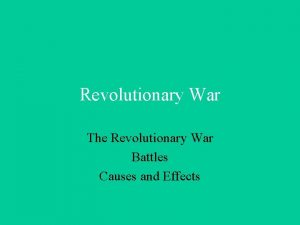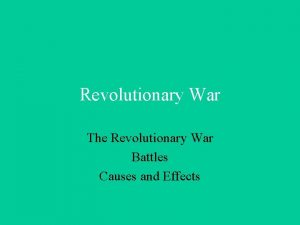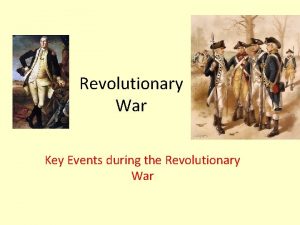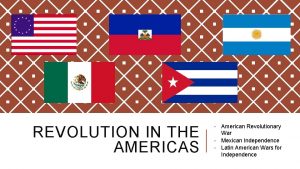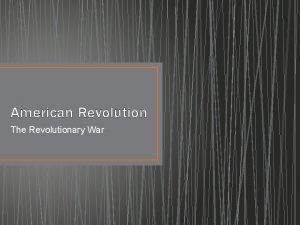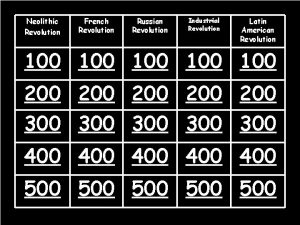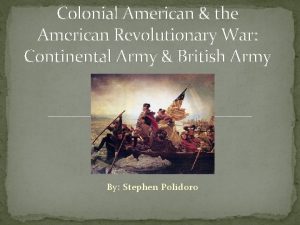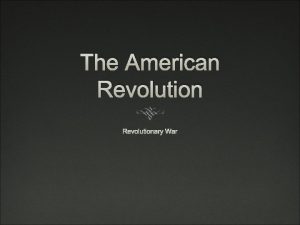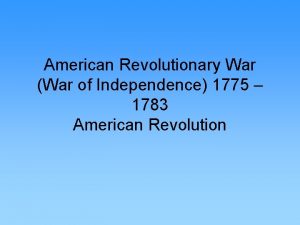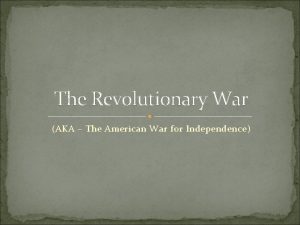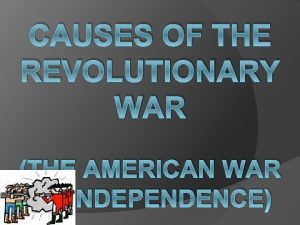The American Revolution The Revolutionary War Definitions Revolutionary





































- Slides: 37

The American Revolution The Revolutionary War

Definitions • Revolutionary War – a war between Britain and the US in which the US wanted their independence from Britain • Mercenaries – professional soldiers who would fight for anyone who would pay them • Strategy – an overall plan to do something or carry out something • Ally – when nations join together for a common effort (such as winning a war) • Guerrillas – soldiers who are not apart of a regular army, who operate on their own

War Has Begun! • In 1775, recruiters were looking for volunteers to go to New York and fight. • The British were rumored to have landed 15, 000 troops • Joseph Martin, at the age of 16, traded his plow for a musket and headed to New York, as it was his dream to be a soldier • The US army was ill prepared, sick, and ill equipped to fight.

British Army • The British were well trained, well equipped, and well supported by the Royal Navy • The British had actually landed 25, 000 troops into New York, on more than 400 ships • This was the biggest army and fleet they had ever sent overseas • They had every advantage to win this war, but would they?

American Weaknesses • Few Americans were trained for battle • They did not stay long in the army, so there were constantly new soldiers to train • Numbers were low • Weapon shortages • Food shortages • Uniform shortages

American Strengths • Immense patriotism, especially Joseph Martin, and others who gave their lives to defend liberty • Had the aid of the French, who also disliked the British (an ally) • George Washington – who kept the army together, gave the soldiers courage and confidence and inspired them to continue

British Strengths • Great numbers in their army (over 50, 000 troops) • King George hired over 30, 000 mercenaries • Well trained and well supplied • Much more artillery experience • Used Hessian mercenaries from Germany • Excelled in large, ground fought battles

British Weaknesses • Long distance between Britain and America • British taxpayers were getting angry footing the bill for war • Sending supplies and troops across the ocean was costly and slow • Poor leadership by Lord George Germain • The British people could not see the vitality in defeating America • Germain kept changing plans and generals looking for the key to success

Assignment Day 1 • Write a compare and contrast essay on the strengths and weaknesses of both the Americans and British during the war.

Britain Invades! • Upon British return to the colonies, Gen. William Howe lead troops into New York City. • From there, Germain’s plan was to head north and capture Massachusetts. • As George Washington hurried his troops to New York to block the British invasion, he heard the news that congress had declared the colonies “free and independent” • He then read the declaration to his troops aloud

African Americans • Confusion was raised by African Americans and their role in the Revolution • Did Jefferson really mean “all people” were free? • Many blacks were joining the cause, and fighting with militiamen early on. • African Americans, however, were banned from fighting in the war, as Washington was worried it would become a haven for runaway slaves

African Americans (Con’t) • The British were promising freedom to slaves who helped fight for the king. • Thousands of slaves took the call and became Loyalists to fight for the king. • A shortage of volunteers forced Washington to change his mind, and in 1779 15% of soldiers were black. • Many also fought for the Continental Navy • While fighting alongside, many whites had taken the steps to end slavery in many colonies

Defeat in Brooklyn, New York • American & Britain met in Brooklyn on Aug 27, 1776 • It was a huge defeat for the inexperienced American army • The British lost 377, while the Americans lost 1, 407 • Howe ordered the British to stop their attacks, waiting for Washington to surrender • Washington refused to retreat, but yet he knew to save his army he would have to.

Fading Hopes • Americans began to face many defeats after NY • For soldiers, there was little food, which lead to weakness and exhaustion • The weather was cold, wet, and icy which just added to the soldiers misery • Many soldiers enlistment time was nearly up, so many were preparing to leave and head home • Word spread that anyone who was in the Continental Army had to be crazy to stay! • Washington only had a few thousand troops left by the time they reached Pennsylvania. • They needed more men or “the game was over”.

Assignment Day 2 In a 2 pg essay, explain the war thus far, including the following facts and people: ØLord George Germain ØGeneral William Howe ØAfrican Americans ØDefeat in NY ØWashington ØStruggles of the Continental

Pep Talks Toward Victory • After their numerous defeats, Washington knew he needed to motivate his troops • He read from Thomas Paine’s new pamphlet, The Crisis: “These are the times that try men’s souls. The summer soldier and the sunshine patriot will, in this crisis, shrink from the service of their country; but he that stands NOW, deserves the love and thanks of man and woman. ”

Washington’s Plan for Victory! • Washington devised a sneak attack • British troops in Trenton, NJ were camped for the winter months • On Dec 25, 1776 troops crossed the ice-topped Delaware River to surprise British troops who were sleeping off their Christmas dinners • Washington’s troops captured 868 prisoners without losing a single man • A week later, they captured 300 troops in Princeton, NJ


Turning of the Tide • When the war started, both sides had a plan for winning • The strategy was to defeat the enemy in battle • After nearly being defeated, Washington decided that he would avoid big battles with his lack of supplies and numbers, and focus on defensive attacks to tired the British out.

Brains vs. Braun

New British Strategy • Germain revised the British plan as well • His plan was to take control of New York’s Hudson River Valley • By taking control of the waterway, the Continental Army would collapse from lack of supplies and men • General John Burgoyne left Canada with 8, 000 soldiers to head to New York and meet up with General Howe

Forward March!

Difficult Route • The route the British were taking through Canada turned out to be 20 miles of tangled wilderness and difficult terrain • The army consisted of 600 wagons of supplies and such, which also had to cross through that terrain • The soldiers were exhausted from building bridges, chopping trees, and building roads through swamps

Gen. Howe Has His Own Plans • Instead of heading to NY as planned, Howe decided to head to Philadelphia, which was the “rebels” capital • He hoped he could lure the Americans into another battle defending their capital • Washington played games with Howe, attacking here and then disappearing into the countryside. He would not fight for Philadelphia.

Burgoyne’s Army Left Alone • After Howe decided to change plans, the other half of the British troops were left alone • By the time they reached the Hudson River, they were outnumbered by American militia • On October, 1777, Burgoyne accepted defeat • This sparked a turning point for Americans

Allies to the Rescue! • After this victory, France entered the war as an ally to the US and supplied food, weapons, money, and troops. • Spain also joined the war against Britian. • The American cause was looking hopeful!

Assignment Day 3 Choose from one of the following: 1. Write a letter from the point-of-view of General Howe after being taken captive in Trenton, NJ to British officials *or* 2. Write a letter from Burgoyne’s point-of-view to British officials after their difficult journey *or* 3. Write a letter from Washington’s point-of-view to congress once France and Spain joined the war efforts

Valley Forge • After the Saratoga victory, Congress declared a day of Thanksgiving • Washington and his men were on their way to Valley Forge, PA to make camp for the winter • The men were naked and starved • Baron Friedrich von Steuben was put in charge of training the troops and discipline • Marquis de Layfayette used his own money to buy the troops food and clothes, which raised the troops morale and spirits

Battle of Monmouth • Sir Henry Clinton replaced General Howe as British Commander • He retreated the troops from Philly and returned to New York City • On June 28, 1778, Washington’s army caught up with Clinton’s and a battle took place in Monmouth, NJ • The Americans won as the British slipped across the Hudson River to safety in New York City

North and South • The war in the North was over, after the British failed to conquer any northern state • The new plan was to move the war to the South • Clinton launched an attack on Savannah, GA, and then headed to North and South Carolina • Clinton returned to NYC, leaving General Cornwallis in charge of the South • Guerillas stopped British advancement through the Carolinas and kept the American cause alive

Greene vs. Cornwallis Greene lead Conrnwallis’s troops on a wild goose chase through the southern backcountry Cornwallis wrote that he was tired of marching around the country and took his army and left

Yorktown France joined Washington’s army In New York Washington set a trap for Cornwallis They surrounded Cornwallis with more than 16, 000 troops and controlled the waterways The trap was sprung on Oct 6, 1781 Joseph Martin watched with pride as the American flag was raised as they fired on Yorktown

Cornwallis Surrenders • When no British ships arrived to help, Cornwallis agreed to surrender • 8, 000 British troops were in a line and walked slowly out of Yorktown in surrender • Cornwallis did not attend, as he couldn’t bare to publically surrender in front of a crowd


Peace Treaty • In 1783, representatives from both Britain and US signed a peace treaty in Paris • In it, it stated that: 1. ) Britain will recognize the US as an independent nation 2. ) Britain gave up its land from Canada to Florida 3. ) The US will return anything taken from the Loyalist during the war

The Cost of War • • 6, 200 American lives lost in combat 10, 000 American lives lost to diseases 8, 500 Americans lost as British prisoners More Americans died in the Revolutionary War than in any other war (other than the Civil War, in which we fought each other)

Day 4 Assignment • Complete study guide for Chapter 7 • Test Tomorrow!
 Main causes of the american revolution
Main causes of the american revolution How could the french revolution have been avoided
How could the french revolution have been avoided Music of the revolutionary war
Music of the revolutionary war Revolutionary war literature
Revolutionary war literature Ssush
Ssush Continental army strengths and weaknesses
Continental army strengths and weaknesses Swampfox mohawk
Swampfox mohawk Boston tea party diorama
Boston tea party diorama American revolution readers theater
American revolution readers theater Revolutionary war blockade
Revolutionary war blockade Map of the battle of fort ticonderoga
Map of the battle of fort ticonderoga Revolutionary war abc book
Revolutionary war abc book Warchap
Warchap British strengths and weaknesses
British strengths and weaknesses American revolution interactive notebook
American revolution interactive notebook Which battle marked the end of the revolutionary war?
Which battle marked the end of the revolutionary war? British strengths during the revolutionary war
British strengths during the revolutionary war Turning point of the revolutionary war
Turning point of the revolutionary war Inquiry answer 12
Inquiry answer 12 Famous virginians in the revolutionary war
Famous virginians in the revolutionary war Lydia darragh quotes
Lydia darragh quotes Revolutionary war jeopardy
Revolutionary war jeopardy American literature 1750 to 1800
American literature 1750 to 1800 Revolutionary literature definition
Revolutionary literature definition Russian revolution vs french revolution
Russian revolution vs french revolution Third agricultural revolution definition
Third agricultural revolution definition Chapter 27 world war 1 and the russian revolution
Chapter 27 world war 1 and the russian revolution The french revolution timeline
The french revolution timeline War with austria french revolution
War with austria french revolution Kzbho6asboc -site:youtube.com
Kzbho6asboc -site:youtube.com Peter zenger american revolution
Peter zenger american revolution American revolution facts
American revolution facts Causes and effects of american revolution
Causes and effects of american revolution King during american revolution
King during american revolution Long term causes french revolution
Long term causes french revolution Who was the king during the american revolution
Who was the king during the american revolution Effect of the american revolution
Effect of the american revolution Discuss the following questions
Discuss the following questions
